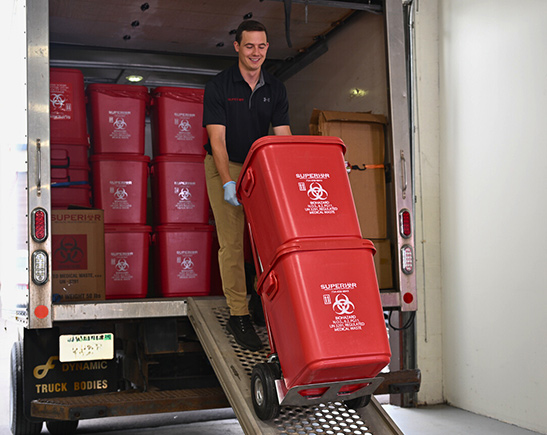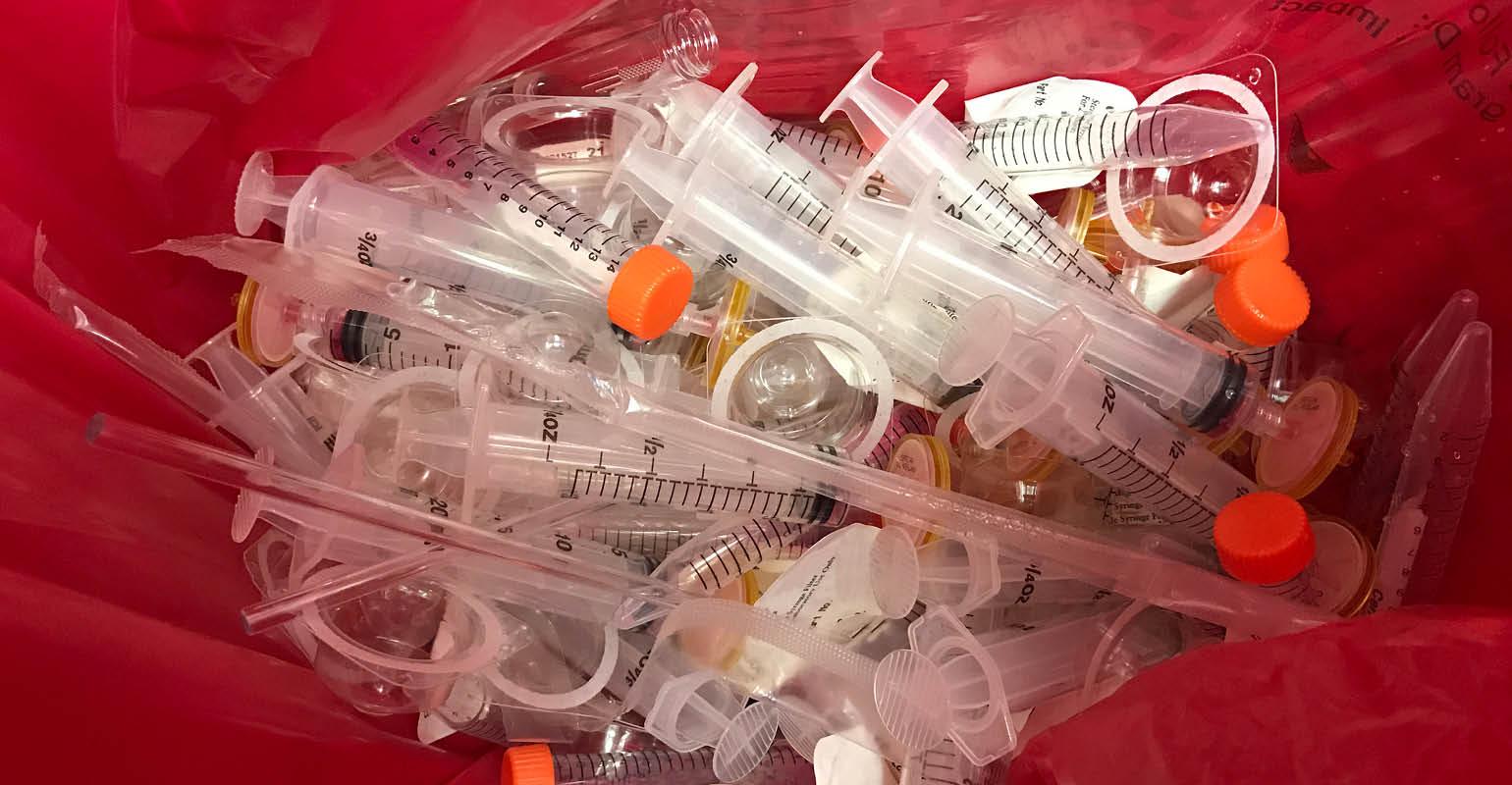Medical Waste Removal Quality: Elevating Safety And Security Requirements in Your Center
Medical Waste Removal Quality: Elevating Safety And Security Requirements in Your Center
Blog Article
Keep Compliant and Safe: Just How to Take Care Of Medical Waste Appropriately
In today's ever-changing medical care landscape, making certain conformity and security when it pertains to medical waste disposal is of utmost relevance. The proper monitoring and disposal of medical waste not only shields the setting however also safeguards the health and health of health care workers and the public (medical waste disposal services with WasteX). Navigating the facility regulations and standards bordering medical waste disposal can be a complicated job. In this discussion, we will certainly discover the various kinds of clinical waste, the associated dangers, the lawful needs, and the most effective methods for keeping a secure and compliant clinical waste monitoring system. Stay tuned to find the green solutions that are transforming the method clinical waste is disposed of, as we shed light on this important facet of medical care procedures.
Value of Appropriate Clinical Waste Disposal
Appropriate medical waste disposal is of utmost importance in ensuring the safety and well-being of both medical care employees and the public. Medical waste, that includes things such as made use of needles, infected dressings, and ended medicines, positions major health threats if not handled and dealt with correctly.

Furthermore, inappropriate disposal of clinical waste can cause environmental contamination. When medical waste is not set apart, dealt with, or disposed of properly, it can find its way into garbage dumps or bodies of water, potentially contaminating the water, soil, or air resources. This can have harmful effects on ecological communities and human wellness, as dangerous substances might leach into the setting or be released right into the environment.
Kinds Of Clinical Waste and Their Dangers
The diverse variety of medical waste created by health care facilities provides various threats that should be carefully resolved to guarantee correct disposal and stop potential damage to public health and the atmosphere. Medical waste can be categorized into different groups based on its characteristics and level of threat.
One sort of clinical waste is infectious waste, which consists of items that are polluted with blood or various other potentially transmittable materials. This can include made use of needles, syringes, and other sharp items, along with tissues, swabs, and dressings from individuals with infectious illness. Inappropriate disposal of infectious waste can cause the transmission of dangerous microorganisms and the spread of infections.
An additional category is contaminated materials, which consists of products that are harmful, flammable, harsh, or responsive. This can include chemicals, pharmaceuticals, and specific clinical devices. Mishandling or inappropriate disposal of dangerous waste can cause environmental contamination and position dangers to the wellness of waste employees and the public.
Radioactive waste is one more sort of clinical waste that have to be carefully managed. This waste includes materials that consist of contaminated materials, such as made use of radiation treatment sources or contaminated laboratory supplies. Incorrect handling or disposal of contaminated waste can lead to radiation exposure and serious health dangers.
Finally, non-hazardous general waste, such as paper, packaging materials, and food waste, is also generated by healthcare facilities. While this waste may not pose substantial threats, it still requires to be effectively taken care of to keep sanitation and stop the tourist attraction of bugs.
To make sure the risk-free disposal of medical waste, healthcare facilities have to apply correct partition, transportation, storage space, and therapy methods. This consists of making use of proper containers, labeling, and training for staff, as well as following regional policies and standards. By attending to the dangers associated with various types of clinical waste, health care facilities can shield public health and wellness and the environment.
Lawful and Regulative Requirements for Disposal
In order to make certain the risk-free and proper disposal of clinical waste, healthcare centers should abide by legal and governing demands. These needs are in area to safeguard public wellness and the atmosphere from the possible risks related to medical waste. Clinical waste is this link classified as an unique category of waste because of its possible to transmit transmittable diseases and consist of harmful compounds.

Some typical needs include the segregation and appropriate product packaging of clinical waste, the usage of approved containers and tags, and the execution of secure handling and transport treatments - medical waste removal services. Healthcare centers may additionally be needed to keep documents of their waste monitoring practices and supply documents to regulatory authorities upon demand
Failing to adhere to these legal and regulatory needs can result in penalties, fines, and reputational damages for healthcare facilities. It is, for that reason, crucial for medical care service providers to focus on compliance and establish durable waste monitoring methods to ensure the safe and appropriate disposal of clinical waste.
Best Practices for Safe Medical Waste Administration
Healthcare facilities need to stick to sector finest methods to make certain the efficient and secure administration of clinical waste - medical waste disposal services with WasteX. Implementing these best practices not only aids protect the atmosphere and public wellness however additionally minimizes the risk of prospective legal and monetary consequences
One of the essential finest practices is the correct partition and containment of different kinds of clinical waste. This involves using color-coded containers and clearly identifying them to make certain that each kind of waste is thrown away correctly. Additionally, health care facilities need to have designated areas for storage and disposal of clinical waste, with clear standards and treatments in location.
One more important aspect of risk-free clinical waste monitoring is his response the training and education and learning of medical care staff. All personnel who deal with clinical waste must obtain detailed training on the appropriate handling, storage, and disposal procedures. It is essential to guarantee that employee know the possible dangers connected with clinical waste and are outfitted with the necessary knowledge and skills to manage it securely.
Routine surveillance and auditing of waste monitoring practices is likewise important. This includes frequently assessing waste administration treatments, conducting evaluations, and preserving exact documents. By monitoring waste monitoring techniques, health care facilities can determine any kind of possible problems or locations for renovation and take rehabilitative activities appropriately.
Last but not least, medical care centers need to focus on the use of eco-friendly disposal techniques whenever feasible. This includes utilizing waste therapy technologies such as autoclaving or incineration, which can help in reducing the quantity and harmful nature of medical waste.
Eco-Friendly Solutions for Medical Waste Disposal
Implementing eco-friendly solutions for clinical garbage disposal is important for medical care facilities to decrease environmental impact and make certain sustainable methods. Standard approaches of clinical waste disposal, such as incineration and landfilling, have actually been located to release unsafe pollutants right into the air and infect soil and water sources. Because of this, there is a growing demand for alternative techniques that are both eco friendly and risk-free.
These systems use sophisticated innovations to safely refine clinical waste within the healthcare facility itself. By treating the waste on-site, transportation exhausts and risks associated with off-site disposal are minimized.
An additional eco-friendly method is the adoption of reusing programs for particular sorts of clinical waste. Materials such as glass, plastics, and metals can be recycled instead of disposed of in landfills. By executing segregation and recycling programs, health care facilities can substantially lower their waste quantity and decrease their ecological impact.
In addition, medical care centers can discover the usage of multiple-use clinical tools and products. By going with multiple-use things, instead of single-use options, the amount of waste generated is considerably decreased. Reusable items can be sanitized and used multiple times, resulting in price financial savings and much less ecological effect.
Final Thought
In final thought, proper disposal of clinical waste is critical for keeping conformity and guaranteeing safety. Recognizing the sorts of medical waste and their associated threats is very important in order to execute the appropriate disposal approaches. Sticking to regulative and legal needs is necessary for avoiding fines and securing the environment. Adhering to finest practices for risk-free medical waste monitoring and exploring eco-friendly options can contribute to a sustainable and liable technique to go right here garbage disposal in the medical care industry.
In this conversation, we will explore the different kinds of medical waste, the involved threats, the lawful requirements, and the finest techniques for keeping a certified and secure clinical waste management system - medical waste removal.One type of medical waste is contagious waste, which consists of things that are infected with blood or other potentially infectious materials.Radioactive waste is one more kind of clinical waste that have to be carefully managed. Medical waste is classified as a special category of waste due to its prospective to transfer contagious illness and consist of harmful substances
Following best practices for safe medical waste monitoring and discovering eco-friendly solutions can contribute to a lasting and liable strategy to throw away disposal in the medical care sector. medical waste disposal services with WasteX.
Report this page